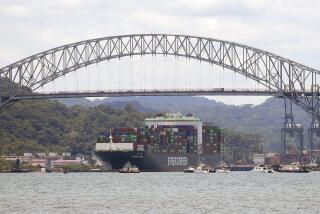UPDATE / U.S.-PANAMA RELATIONS : Ties Cool in Dispute Over Seized Papers
PANAMA CITY — The people don’t applaud U.S. troops so much these days. T-shirts bearing pro-U.S. invasion slogans hang unsold in the shops. And politicians are beginning to think they can make a name for themselves by criticizing U.S. policy.
The bloom may not be entirely off the rose, but the petals are fading amid signs of uncertainty in relations between Washington and the coalition government the United States installed after the invasion last December.
“We are just beginning to realize that our national interests are not always in sync with the interests of the United States,” Ruben Carles, Panama’s controller general, said recently.
“We are still close friends, and we are in President Bush’s debt (for ordering the ouster of strongman Manuel A. Noriega), but that doesn’t mean everything (the Americans) want should be granted unconditionally.”
The focus of discontent is the U.S. refusal to hand over to Panamanian investigators the thousands of boxes of confiscated Noriega government documents.
Although Noriega’s lawyers in Miami have access to some of the files as they prepare for his trial on drug trafficking charges, the U.S. military in Panama has refused to give any of the documents to the government here.
“The United States is protecting robbers and thieves and obstructing justice,” Eusebio Marchosky, chief prosecutor for the controller general, complained in an interview. “I am in agreement with the invasion, but we are the owners of the documents. If I am to complete my work, I have to see the documents.”
Marchosky thinks the confiscated documents contain proof that Noriega and his followers looted the national treasury and committed criminal acts as well.
He said Central Bank records indicate that one of Noriega’s closest aides, Col. Marcos Justines, stole $47 million just before the invasion.
Microfilm was found at the bank, he said. “If that had been destroyed, or if there hadn’t been any microfilm, the only proof of the theft would be in the documents held by the Americans.”
Marchosky said he suspects the United States is being encouraged to keep the documents from him by Ricardo Arias Calderon, Panama’s second vice president. Arias Calderon, who is in charge of reforming Panama’s military, has placed many former Noriega officers in key posts in the new Panamanian Public Force.
“He is afraid we will find documents that prove some of them are guilty of crimes,” Marchosky said.
Spokesmen for the U.S. military here refuse to discuss the matter.
Another touchy issue is the continued U.S. use of military installations here. Under the Panama Canal Treaties, these installations were ceded to Panama. They were seized in the course of the invasion, and Panamanian leaders say they should be relinquished.
Some have been returned to Panama, notably the air base at Rio Hato, but most remain under U.S. control.
A Southern Command spokesman, William Ormsby, said that Panama has “temporarily ceded the bases to the United States.
As some Panamanians see it, the Americans are holding on as part of a plan to force Panama to renegotiate the treaties so as to allow a U.S. troop presence in the country, but U.S. and Panamanian officials rule this out. The treaties call for the complete withdrawal of U.S. troops by the year 2000, when the canal is to be turned over to Panama.
Friction also continues over the issue of U.S. economic aid. Panamanian officials will not comment for the record, but are angry about the delay. Congress took almost six months to approve the $400-million package.
Also, Panamanians are upset about how the money is to be allocated. Only about $100 million will go to rebuild the economy and “that simply isn’t enough,” an official said.
He was especially bitter about the condition that $130 million must go to reducing Panama’s debt to international financial institutions.
“We didn’t incur the debt,” he declared. “Noriega did.”
“Look,” the official said, “I don’t want to sound ungrateful, but most of our economic problems stem from Noriega, and I don’t have to remind you that (the United States) supported him for all but two years of his regime. . . . I think it is reasonable to expect more.”
More to Read
Sign up for Essential California
The most important California stories and recommendations in your inbox every morning.
You may occasionally receive promotional content from the Los Angeles Times.










